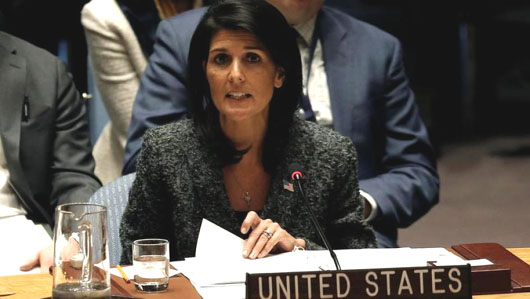by WorldTribune Staff, August 16, 2017
After Iran, citing new sanctions imposed by the Trump administration, threatened to walk away from the Joint Comprehensive Plan of Action (JCPOA), the Trump Administration was quick to respond.
U.S. Ambassador to the UN Nikki Haley said the Islamic Republic can’t be allowed to “hold the world hostage” over the 2015 nuclear accord.

Iranian President Hassan Rouhani on Aug. 15 said the new sanctions show U.S. President Donald Trump is “not a good partner” and that could lead Teheran to abandon its commitment to curb nuclear activities under the deal “within hours.”
Haley responded that the sanctions imposed by Trump were unrelated to the nuclear deal, adding that Teheran must be held responsible for “its missile launches, support for terrorism, disregard for human rights, and violations of UN Security Council resolutions.”
“Iran cannot be allowed to use the nuclear deal to hold the world hostage,” Haley said.”The nuclear deal must not become ‘too big to fail.’ ”
Haley added that “Iran, under no circumstances, can ever be allowed to have nuclear weapons.”
Rouhani told lawmakers in Teheran that the Trump administration was repeatedly trying to force Iran to change through pressure tactics rather than negotiations.
“The failed experience of sanctions and coercion brought their previous administrations to the negotiating table,” he said in a televised speech.
“If they want to go back to that experience, definitely in a short time – not weeks or months, but in the scale of hours and days – we will return to our previous situation very much more stronger.”
“In recent months, the world has witnessed that the U.S., in addition to its constant and repetitive breaking of its promises in the JCPOA, has ignored several other global agreements and shown its allies that the U.S. is neither a good partner nor a reliable negotiating party,” Rouhani told parliament.
Meanwhile, Israeli media reports indicated that Iran is building a factory in Syria to manufacture long-range rockets.
An Israeli Channel 2 television news report showed images it said were taken by an Israeli satellite showing a weapons-factory construction site in northwest Syria near the Mediterranean coastal town of Baniyas.
The Times of Israel reported that the missile factory could be used for the production and underground storage of Scud missiles capable of striking Israel.
Israeli Prime Minister Benjamin Netanyahu has warned that Iran is increasing presence in Syria as the tide has turned in favor of Syrian President Bashar Assad, Iran’s ally.
“Our policy is clear: We vehemently oppose the military buildup by Iran and its proxies, primarily Hizbullah, in Syria and we will do whatever it takes to protect Israel’s security,” Netanyahu said in a speech last week.
The Trump administration has said it will not accept any peace settlement in Syria that allows Iran to maintain a military presence in the country.
The Times said Iran was also helping Hizbullah build subterranean factories in Lebanon to make Fateh-110 medium-range missiles that would be able to reach most parts of Israel.
Israeli Defense Minister Avidgor Liberman last month publicly warned Hizbullah and Iran against building the weapons factories.
“We are fully aware” of the rocket factories, Liberman told military correspondents at a briefing in Tel Aviv. “We know what needs to be done…. We won’t ignore the establishment of Iranian weapons factories in Lebanon.”
Geostrategy-Direct.com reported on Aug. 9 that North Korea recently sent a delegation of economic and military officials to Iran, including the North’s “No. 2” leader, for a 10-day visit.
Kim Yong-Nam, chairman of the North’s Supreme Assembly, was reportedly in Teheran for the inauguration of Rouhani’s second term, but analysts said the visit would likely result in expanded Iran-North Korea military ties.
“There’s been fairly extensive cooperation on missiles,” said Matthew Bunn, a nuclear proliferation analyst and professor of practice at Harvard University’s John F. Kennedy School of Government.
“And in fact, early generations of Iranian missiles were thought to be basically modestly adapted North Korean missiles.”
Subscribe to Geostrategy-Direct __________ Support Free Press Foundation
